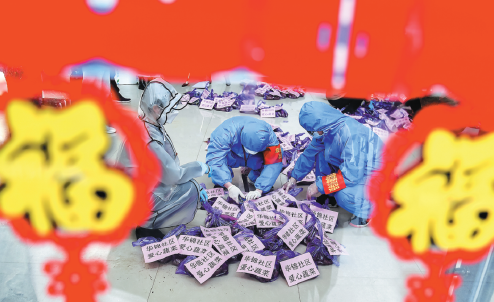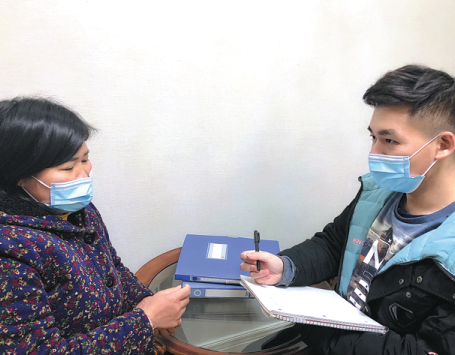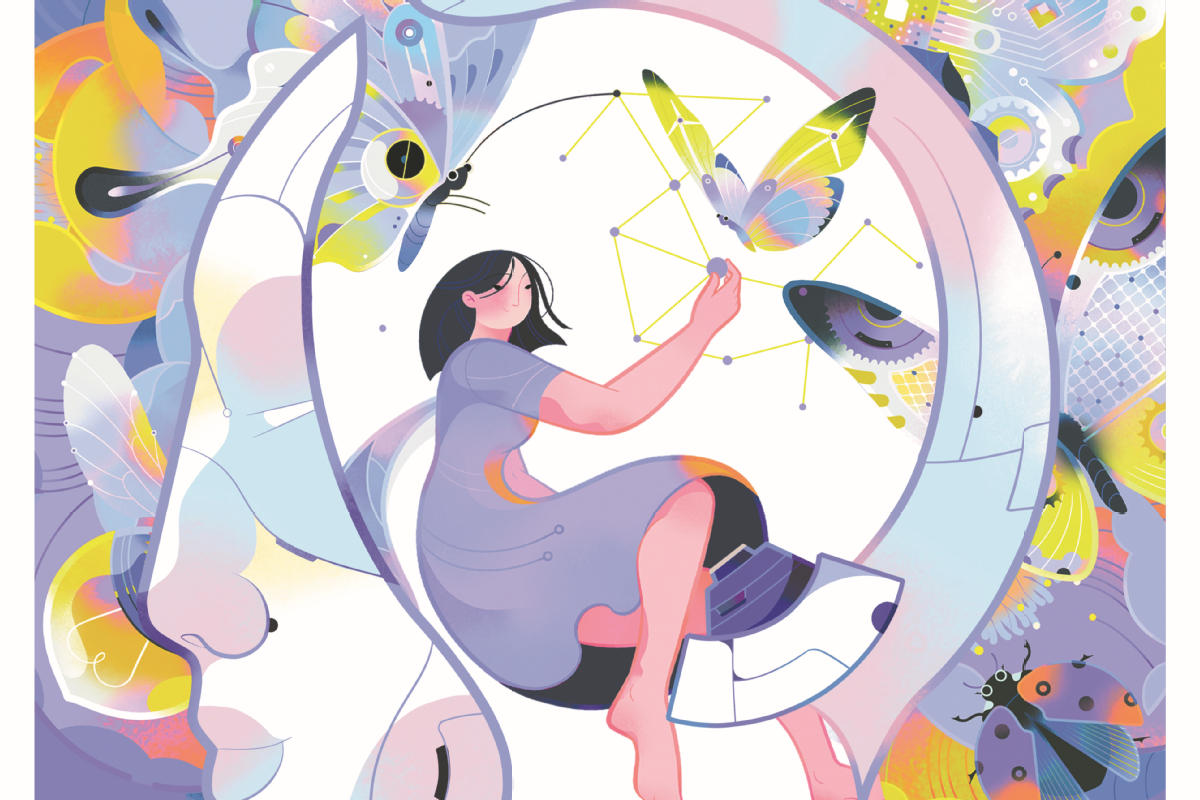Lights of the night
Volunteer groups emerge online to help patients of the coronavirus, Wang Ru reports.

An Songsong noticed a post on WeChat on Jan 23 about the coronavirus, including how to protect oneself from infection, official data and refutations of rumors.
More than 100 netizens had added information to the original post, as it was open to writing. An was impressed with the new way of contributing to the fight against the virus. He joined the A2N, a volunteer group behind the post.
Many such groups have emerged on Chinese social media since the outbreak, with people doing online and offline work in an organized manner.
The A2N, or the "anti-2019-nCoV "group, was set up online on Jan 22 by Yang Gaojie, an entrepreneur based in Wuhan, Hubei province, the epicenter of the outbreak in China, originally to refute rumors when people didn't have enough understanding of the virus.
Yang first made the post with some information he had identified, and promoted it online so that more people could see it and add information to it.
"In just two days, the post was viewed over 1 million times," says Yang, adding that he then created several smaller WeChat groups and invited people who wanted to join, and the A2N was formed.
There are more than 3,500 members, most of whom are undergraduate and postgraduate students born in the 1990s.
The A2N is divided into different subgroups for rumor refutation, translation, coordination, materials transport, information dissemination and technology support. The work focuses on providing content, which means members verify news and tell people whether it is correct or not. They translate essays and articles related to the virus, and publish related posts on WeChat, Sina Weibo and their own website.
Helping hand
As an active member of the group, An, 24, is responsible for establishing and managing 34 local groups and one overseas Chinese group on social media.
He explains the need to form groups based on location. "We establish local groups in each provincial administrative unit and spread information according to distinctive features of a place. For example, our Inner Mongolia group publishes a Mongolian version of our work so that local people can easily understand the information."
He continues: "By joining the A2N and hearing many people's stories, I have broadened my horizon and found that many people are in need of help. I want to be their voice."
The A2N focused on refuting rumors at the beginning, but members find the function less urgent now.
"Most people have a basic understanding of the outbreak and are less likely to be misled by rumors today. So we have turned our attention to more practical things such as materials and transportation," says Yang.
The Su Volunteer Group initiated by writer Wu Ang has been working to directly help patients.
Because of limited medical resources in Hubei, Wu noticed many infected people had difficulty getting hospital admission. She established the group in early February and has attracted many volunteers.
They began by searching online for people who needed help and putting their information in the hospital system so that they could be admitted eventually for treatment.
Wu says the group had nearly 700 volunteers by Feb 14, including 258 from Wuhan.
So far, they have collected the information of 1,161 sick people, and helped 396 families to apply for hospitalization, 324 of whom have been admitted.
The Su Volunteer Group has a subgroup to locate patients and another to register their symptoms before hospitalization. For each family with patients, volunteers set up a WeChat group so that it is easy to contact them and know about their condition in time.
Another subgroup has volunteers who are doctors and nurses, and they can answer questions from patients, comfort them and offer suggestions.
Many members of the Su Volunteer Group were born in the 1990s.
"The young people give me hope," says Wu.
"A Wuhan volunteer in our group whose family member died of the virus has shared details of the treatment, as well as highlighted matters that need attention and gave information about how to get medicine," she adds.
The volunteers are working tirelessly, some for nearly 18 hours a day.
"I feel comforted by making this contribution. I have also invited my friends to join. When we work together, though we have different opinions at times, our priority is to help save people," says Sang Gege, a member of the Su Volunteer Group.
"The group members seldom greet each other or chat. Everyone is busy. For us, trust and efficiency are the most important things, which help us to conquer difficulties and give us more confidence."
Through his work with the A2N, An got in touch with a medical worker in his hometown, Chongqing, who told him that although medical conditions had improved in hospitals, the mental health of many patients and their family members was still weak.
"I realized I could help people in my hometown as well after talking with the medical worker. We can do various things to help," says An.
Offline effort
A psychology major, An decided to offer emotional support to patients and their families at local hospitals on Jan 26, and gradually organized an offline group to comfort "all those affected by the virus".
"Patients are stressed due to the uncertainty of their physical conditions. Their family members are also anxious and sometimes they quarrel with doctors and nurses. Medical workers are risking their lives while working and can feel bad about such behavior," he says.
"Some other patients who have to vacate their hospital beds for coronavirus patients also feel anxious. They are all among those we want to help."
Now about 20 people, including clinical psychologists and social workers, have joined An's volunteer work. So far, they have helped 68 people in Chongqing. An has contacted some local doctors, and they have provided tips on who needs psychological support.
Social workers speak daily with every patient they help. And psychologists check their situations every two or three days and offer suggestions.
"I once comforted an old woman who was suspected of being infected. After I talked with her several times, she expressed gratitude, saying that she was left alone without family members and everybody stayed away from her and treated her 'like a virus'. She even considered committing suicide but my company made her feel that someone still cared about her," An says.
"There are many in a similar situation."
Besides An's offline group, the A2N also has a materials-transportation subgroup that helps donors to send their goods to suitable recipients. Recently they helped the China Youth Development Foundation, the Hubei Youth Development Foundation and Procter & Gamble company to send 100 boxes of adult diapers to a medical center in Huanggang city in Hubei, and over 1,000 boxes of apples to several hospitals in Wuhan.
The A2N's website displays a quote of the late author Lu Xun: "If no torch is left, I would like to become the only light."
Yang says: "We want to inherit the spirit that Lu Xun hoped young Chinese would hold in the future."



Today's Top News
- Xi congratulates Jose Antonio Kast on election as Chilean president
- China urges opposition to Japanese official's remarks about possessing nuclear weapons
- Ukraine says latest peace talks with US, Europe 'productive'
- Asia's rise and Europe's structural decline
- Economic stability a pillar of China's national security
- Xi taps China's deep wisdom for global good






























